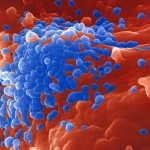Link to Pubmed [PMID] – 26600395
Br. J. Dermatol. 2015 Nov;
BACKGROUND: Merkel cell polyomavirus (MCPyV) is the main etiological agent of Merkel cell carcinoma (MCC). Serum antibodies against the major MCPyV capsid protein (VP1) are detected in the general population, whereas antibodies against MCPyV oncoproteins (T-antigens) have been reported specifically in patients with MCC.
OBJECTIVES: The primary aim of this study was to assess whether detection of serum antibodies against MCPyV proteins at baseline was associated with disease outcome in patients with MCC. The secondary aim was to establish whether evolution of these antibodies during follow-up was associated with the course of the disease.
METHODS: Serum T-antigen and VP1 antibodies were assessed by ELISA using recombinant proteins in a cohort of 143 patients with MCC, including 84 patients with serum samples available at baseline.
RESULTS: Low levels of VP1 antibodies at baseline (<10,000) were significantly and independently associated with increased risk of recurrence (HR 2.71, 95% CI 1.13-6.53, p=0.026) and death (HR 3.74, 95% CI 1.53-9.18, p=0.004), whereas T-antigen antibodies were not found to be associated with outcome. VP1 antibodies did not differ between patients in remission and those with recurrence or progression during follow up. However, T-antigen antibodies were more frequently detected in patients with recurrence or progression at 12 months (p=0.020) and 24 months (p=0.016) after diagnosis.
CONCLUSION: VP1 antibodies constitute a prognostic marker at baseline whereas T-antigen antibodies constitute a marker of disease recurrence or progression if detected more than 12 months after diagnosis. This article is protected by copyright. All rights reserved.

